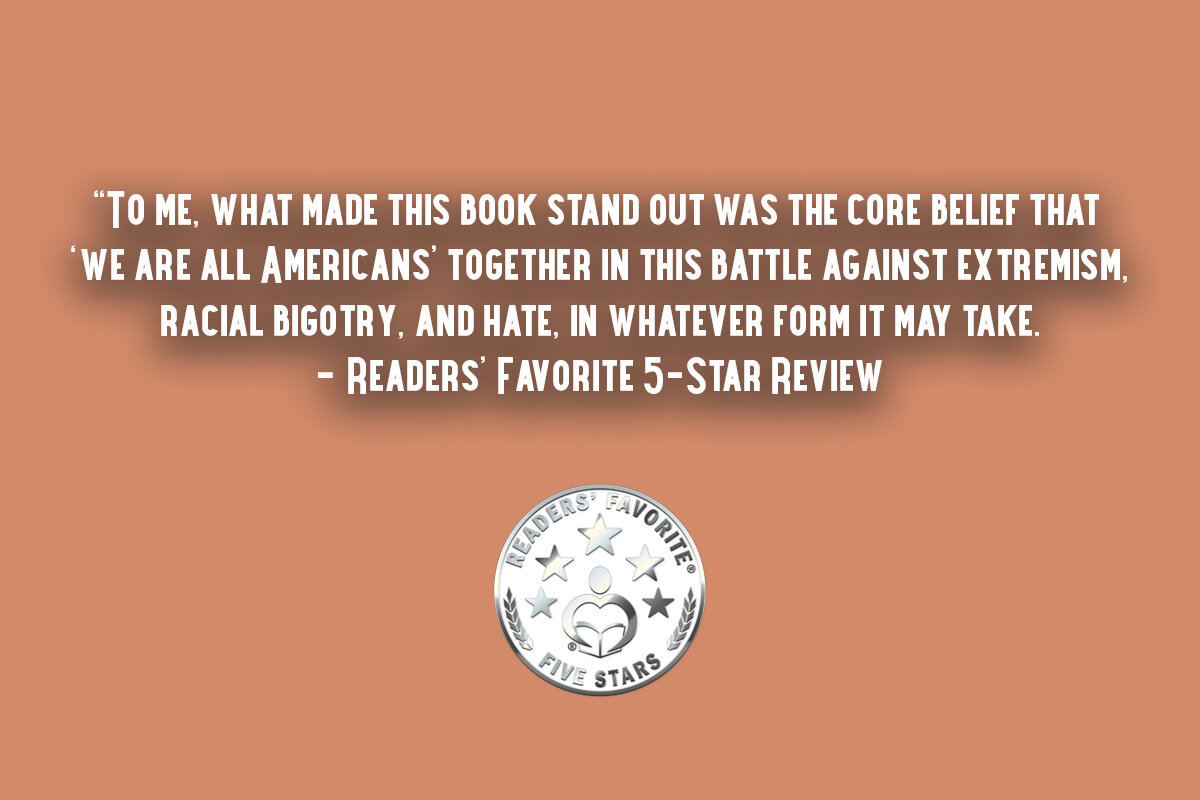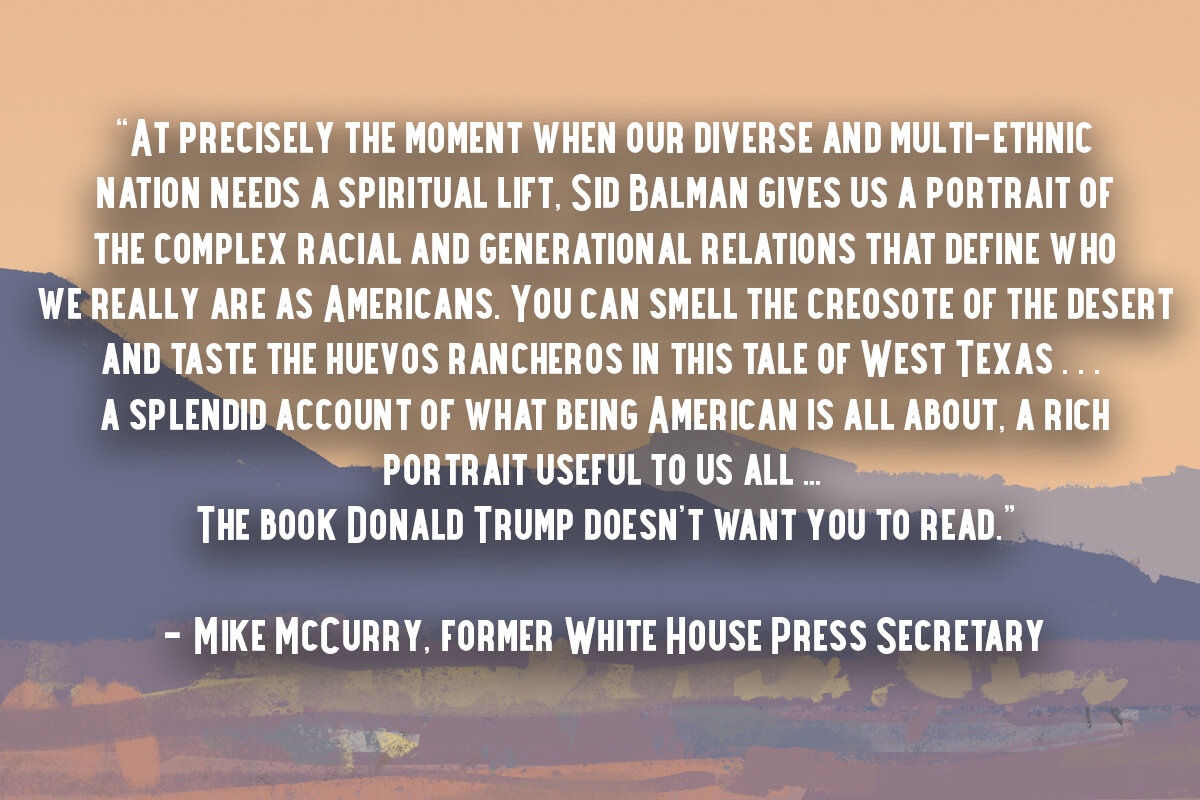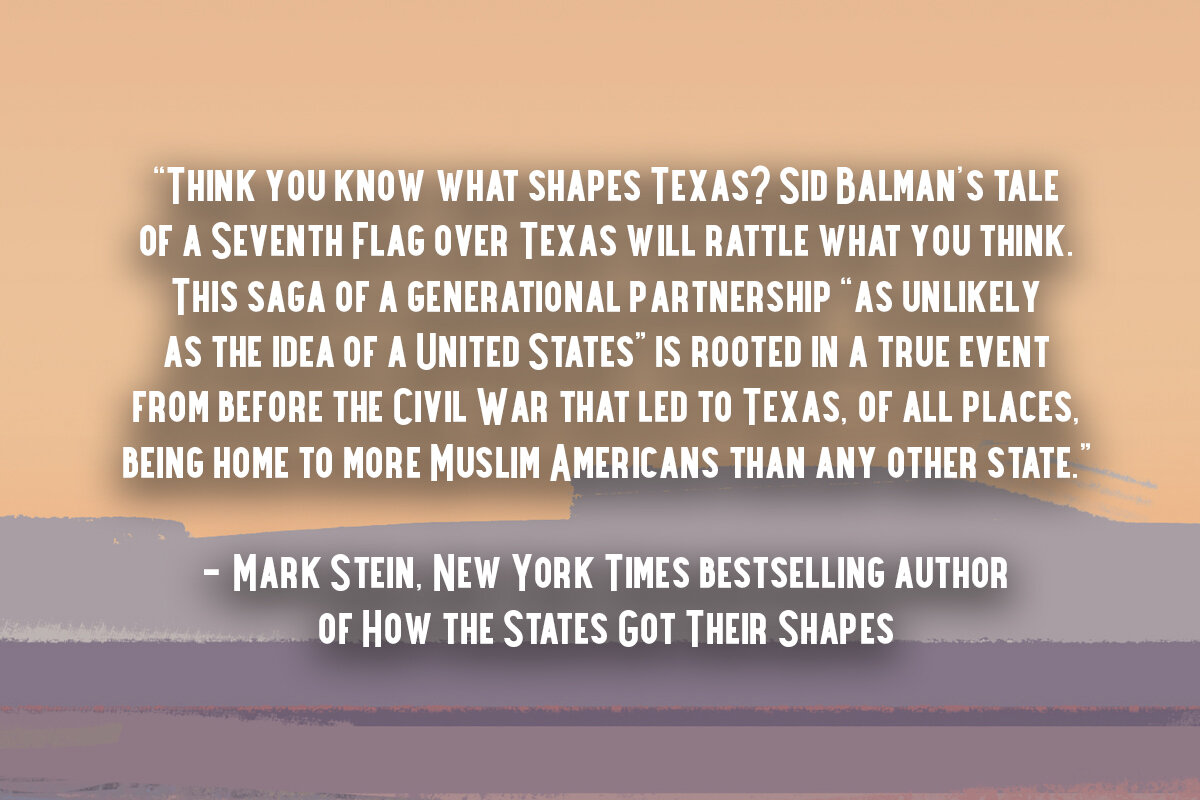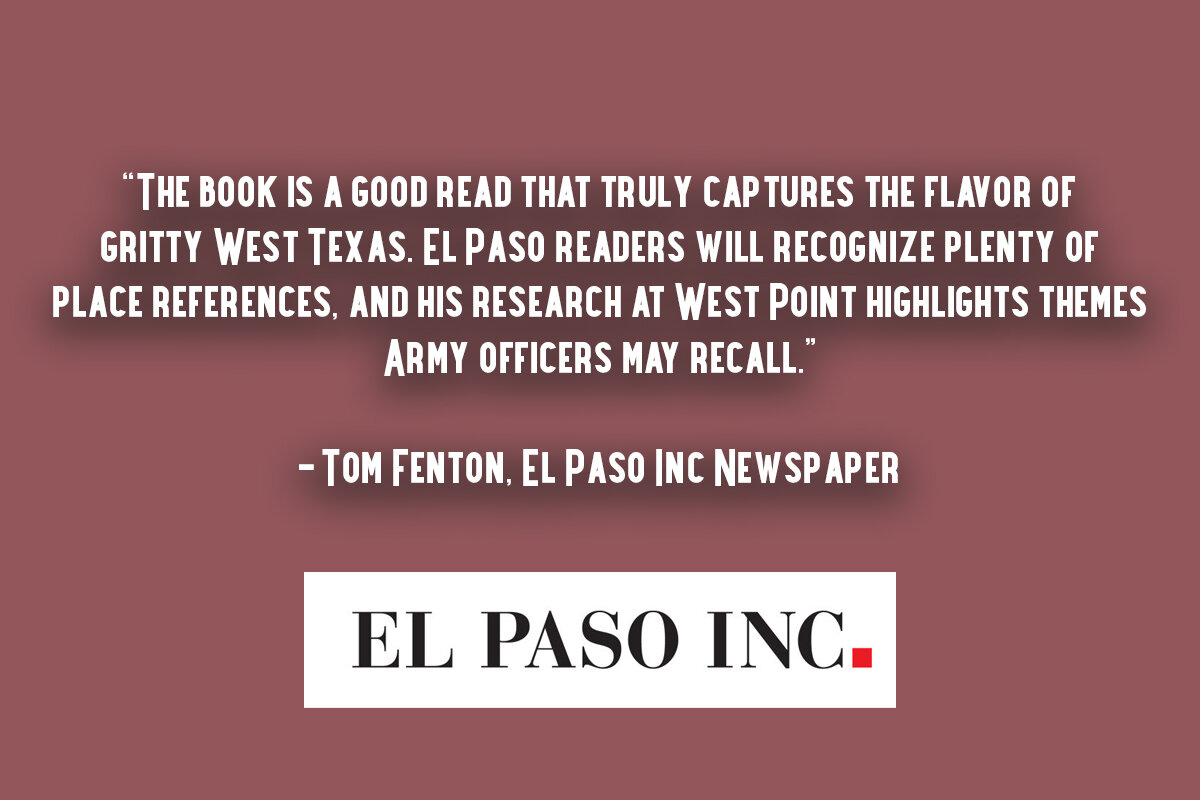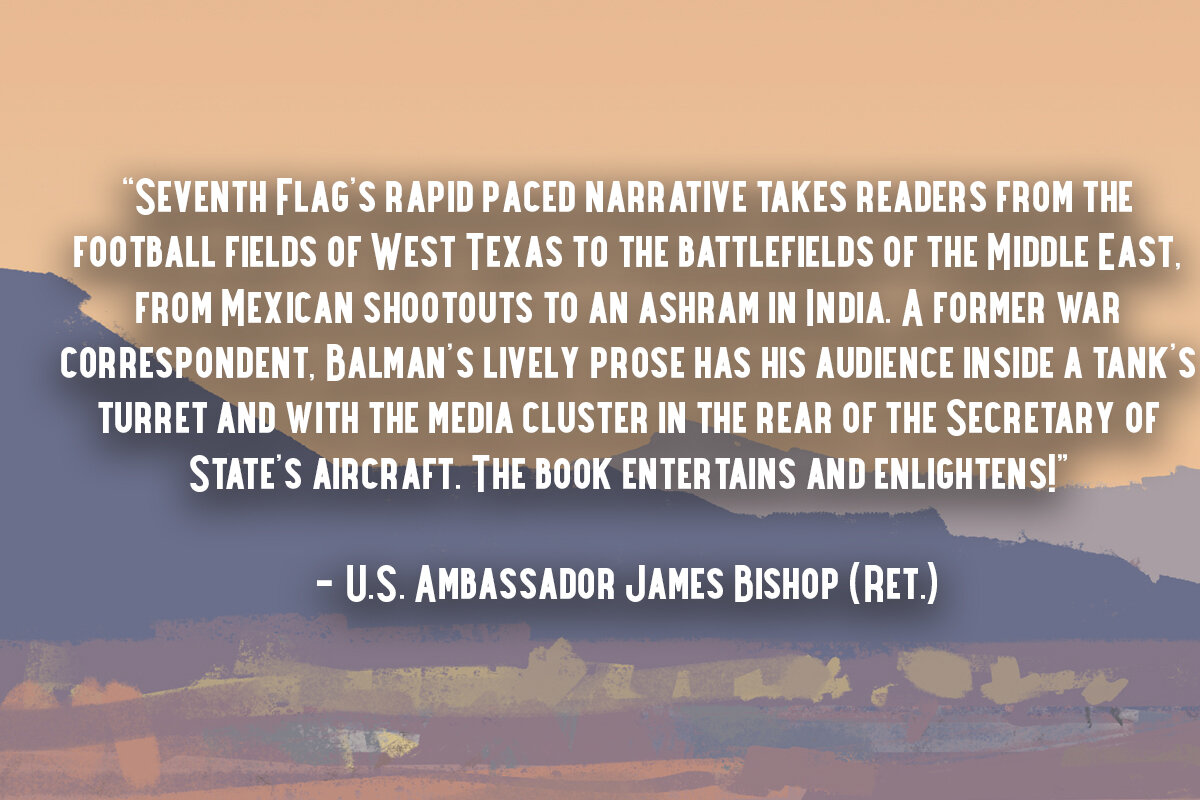A sweeping work of historical fiction, Seventh Flag is a Micheneresque parable that traces the arc of radicalization in modern Western Civilization – reaffirming what it means to be an American in a dangerously divided nation.
The United States and Europe have unraveled since World War II, and radicalism has metastasized into every community, tearing away the decency, optimism and security that shaped the robust democracies of the West for more than eight decades. No place is immune, including the small West Texas town of Dell City, where four generations of an iconic American family and a Syrian Muslim family carve a farming empire out of the unforgiving high desert.
A work of historical fiction, Seventh Flag traces the arc of a nation through these two families as they fight real and perceived enemies – from the beaches of the Western Pacific to the battlefields of the Middle East and from the lawless streets of Juarez to the darkest corners of the Internet. They journey through the football fields of Texas and West Point, the hippie playgrounds of Asia, the music halls of Austin, the terrorist cells of Europe and the political backrooms where fortunes are gained or lost over the rights to Western water.
Their partnership is as unlikely as the idea of a United States, and their powerful friendship can be traced back to a bloody knife fight in a Juarez cantina just after World War II. The bond forged that night between Jack Laws, an Irish-American who staked his claim in West Texas after the war, and Ali Zarkan, whose great grandfather sailed from the Middle East to Texas in the mid-1800s as part of President Franklin Pierce’s attempt to create the US Army Camel Corps, shapes each generation of the families as they come of age and adapt to shifting paradigms of gender, commerce, patriotism, loyalty, religion and sexuality.
Underlying it all is the basic question of identity and citizenship in America, or in Texas, a land over which six flags have flown. The seventh flag is not one of a state or a nation, but a mosaic of cultures, religions and people from every corner of the world struggling to define what it means to be unified under an ambiguous banner.
Reviews
“To me, what made this book stand out was the core belief that ‘we are all Americans’ together in this battle against extremism, racial bigotry, and hate, in whatever form it may take.”
– Readers’ Favorite 5-Star Review
“At precisely the moment when our diverse and multi-ethnic nation needs a spiritual lift, Sid Balman gives us a portrait of the complex racial and generational relations that define who we really are as Americans. You can smell the creosote of the desert and taste the huevos rancheros in this tale of West Texas . . . a splendid account of what being American is all about, a rich portrait useful to us all … The book Donald Trump doesn’t want you to read.”
– Mike McCurry, former White House Press Secretary
“Seventh Flag Tells a tough-as-Texas multi-generational story. Balman expertly guides readers through the paths that people take to become evil, and the horrific choices that must be made to fight loved ones who have tread that path. A must-read … a fun white-knuckle ride that has honest tension and high stakes … extremely engaging.
– Jeff Routner, Houston Chronicle
“A combination of C-Span, Quentin Tarantino and Tom Wolfe.”
-Amazon Reviewer
“Sid Balman’s story comes alive through sympathetic characters and descriptions of places so nuanced I imagined I could almost feel again the scratchy grey wool of the West Point uniform. Anyone paying attention to the global struggle with radicalism will come away with a much keener understanding of the humans who fall prey, the context that claims them, and the necessity to tackle this challenge with more finesse than we currently muster.”
– Kimberly C. Field, Brigadier General USA (ret), West Point 1986, Among The First Combat-Deployed Women and Former Deputy Assistant Secretary of State for Conflict and Stabilization
“Seventh Flag is a book about pluralism. It’s also a book about the tensions increasingly found in pluralistic societies, and about the plague of violent radicalism … including white supremacy and ISIS … that sweeps across the novel’s world and two families over four generations.
-Emma Sarappo, Washington City Paper
“Seventh Flag’s rapid paced narrative takes readers from the football fields of West Texas to the battlefields of the Middle East, from Mexican shootouts to an ashram in India. A former war correspondent, Balman’s lively prose has his audience inside a tank’s turret and with the media cluster in the rear of the Secretary of State’s aircraft. The book entertains and enlightens!”
– U.S. Ambassador James Bishop (Ret.)
“The book is a good read that truly captures the flavor of gritty West Texas. El Paso readers will recognize plenty of place references, and his research at West Point highlights themes Army officers may recall.”
-Tom Fenton, El Paso Inc Newspaper
“An authentic and powerful take on the living beating heart of multiculturalism in America and a nuanced journey through the lives of families whose destinies are entwined together over multiple generations. If you are a fan of prestige TV like Dynasty but also enjoy strong political thrillers like I do then this is the book for you!”
– Mustafa Hasnain, President Creative Frontiers Lahore, Pakistan
“Think you know what shapes Texas? Sid Balman’s tale of a Seventh Flag over Texas will rattle what you think. This saga of a generational partnership “as unlikely as the idea of a United States” is rooted in a true event from before the Civil War that led to Texas, of all places, being home to more Muslim Americans than any other state.”
– Mark Stein, New York Times bestselling author of How the States Got Their Shapes
“Seventh Flag is a thriller with action that heightens in the second half of the book, which opens after the events of 9/11. The narrative has the quality of reportage, rife with anecdotes and historical asides, and deals with such hot-button issues as religion, patriotism, and sexuality. Balman dives into political parties, the dark corners of the internet, and the rise of hate groups and terrorist cells.”
-Jennifer Levin, Santa Fe New Mexican
AWARD NOMINATIONS
Nominee: Independent Book Publishers Association
Bill Fisher Award For Best First Book
Best New Voice, Fiction
Nominee: Readers’ Favorite National Book Award
Nominee: Border Regional Library Association Southwest Book Award
Nominee: Foreward Indies Award
Nominee: National Indie Excellence Award
Nominee: Independent Book Publisher’s Award
Nominee: Sul Ross University Book Club Favorite Award
Q&A with SID BALMAN JR.
Tell us about the title of your novel, “Seventh Flag,” and how it sets the tone for the family saga that unfolds.
No greater highlight of a summer day than when my parents would take us to Six Flags Over Texas, an amusement park near Dallas thematically designed around the six sovereigns that ruled over the state: Spain, Mexico, France, the Republic of Texas, the Confederate States of America and the United States. In Texas and in America today there is a “Seventh Flag” – not one of a state or a nation but one that represents a mosaic of cultures, religions, and people from every corner of the world struggling to define what it means to be unified as Americans under an ambiguous banner. The reader comes to understand this ambiguity through the four generations of two families in the novel – the Laws, an iconic West Texas farming family; and the Zarkans, Syrian-Muslim migrants who help them carve an empire out of the unforgiving high desert.
How much of your novel is based on true events? Are the two central families – the Laws and the Zarkans – based on real people?
As a work of historical fiction, much of the novel – such as creation of the U.S. Army Camel Corps in the mid-1800s, the invasion of Iraq, the Texas water wars and a landmark Supreme Court case – is based on facts, although I may have taken some liberties in portraying events through the characters. I spent many months researching the book with several West Texas families who generously shared their stories. The Laws and the Zarkans are entirely fictitious, mosaics patched together from the experiences of many families.
Is it true that Texas is home to the largest Muslim population in the United States? How did that come to be?
Yes, that’s true and a primary reason for it, which is where “Seventh Flag” begins, can be traced back to an initiative in 1853 by U.S. President Franklin Pierce and his secretary of war, Jefferson Davis from Mississippi. With a congressional allocation of $30,000, they launched the U.S. Army Camel Corp, intended to supplement Cavalry pack animals with camels, which require much less water than mules or horses and can subsist on indigenous vegetation. They dispatched a flotilla of ships to the Middle East, purchasing thousands of dromedaries in such exotic ports as Tunis, Egypt and Malta, and bringing them back along with thousands of Muslim camel handlers to the desert southwest. Although the experiment failed, due to the ornery nature of camels and resistance from rank and file Cavalry, most of the Muslim handlers put down roots in Texas.
How does your book address the topic of violent extremism?
Violent extremism, across the political spectrum, is like a disease that arises from an external infection and spreads through its victims or entire communities over time, leading to violence if left untreated. There are many sources, such as recruitment through the back alleys of the Web, and reasons for an individual’s susceptibility, such as feelings of injustice or marginalization, disenfranchisement and bullying. These factors come into play in the radicalization of two primary characters, Ray Laws, who evolves into a white nationalist, and Anil Zarkan, who flees West Texas to join ISIS.
How has terrorism changed over the past 20 years? What are some common misunderstandings about modern terrorists and radicalized groups?
I prefer to think of it as violence, and the process of recruitment, whether it be white nationalists, Latin American gangs or Islamic terrorists, is largely the same. I see two primary changes over the past 20 years that have fostered the spread of violent extremism: the Internet, with unchecked propaganda, and the politics of division and hatred in the United States.
The battle over water rights is a central theme in “Seventh Flag.” What can you tell us about that Texas Supreme Court case and how that decision had an effect across the rest of the United States?
The case hinged on an initial lower court decision regarding ownership of water in massive aquifers under the farms, both large and small, in Texas. The ruling gave owners the right to as much water as they could pump and allowed them to sell it as they saw fit. Small-holder farmers, on land adjacent to the big farms in Texas, and across the United States, were concerned that they would run out of water, and challenged it in a series of cases. It eventually ended up in the Texas Supreme Court, which ruled in favor of the big farmers. Water scarcity and climate change are exacerbating water issues, and leading to a kind of radicalism among small agricultural concerns. This plays-out over several generations in “Seventh Flag” through the Laws family, which made a fortune by selling water under their farm to El Paso.
How deep do your Texas roots run?
I’m a fourth-generation Texan, raised near Dallas, and have been a “temporary” resident of Washington DC for two decades.
As a fourth-generation Texan, what’s unique about your perspective when it comes to writing historical fiction? Are you a history buff?
I have been lucky in my career as a journalist to have been in a front-row seat for many of the monumental paradigm shifts over the last three decades: the breakup of the Soviet Union, the signing of a peace treaty between Israel and the Palestinians, the Iraq war(s), genocides in Rwanda, the Balkans and Darfur, and the rise of fascism in the United States. I consider myself a student of history who studied and came to understand the way it repeats itself and shapes what comes after. For example, when I covered the Balkan wars, I read Hannah Arendt’s powerful book on the trial of an architect of the Holocaust, “Eichmann in Jerusalem: The Banality of Evil.” I was struck by the similarities between the triggers and methods employed by the Nazis and the Serbs.
What do you hope your readers take away from “Seventh Flag?”
There are so many that it’s hard to narrow it down. But I hope that the three overarching takeaways are that the true greatness of America resides in its diversity, that the fabric of our nation is under siege from the politics of hatred, and that families as well as communities are the most powerful transformative force in society.
You’ve had an incredible career in journalism as a correspondent for one of the largest global news agencies, covering four major wars and traveling with two presidents and four secretaries of war. How did those real-life experiences help shape your novel?
I have been gathering yarn throughout my career, hoping, like every journalist, that a thread would fall out over time that could stitch them all together. The most recent American presidential election, the emergence of fascism, racism and antisemitism took me most of the way there. But a documentary after 9/11 on a Michigan football team at a primarily Muslim high school in Dearborn, which begins during the onset of summer practices during Ramadan, when water and food is forbidden during daylight, sewed it all together and gave me the inspiration for important episodes in “Seventh Flag.”
As a veteran reporter, was it difficult for you to write fiction?
It was liberating, actually; every reporters’ fantasy to be able to write a story while making up all the quotes and most of the characters.
What’s next for you?
“Seventh Flag” was conceptualized as a series of books with similar themes about the experiences of diaspora communities to the United States. The next one looks at Somali migrants -- from the disastrous U.S. military intervention in the early 1990s, so powerfully recreated in Ridley Scott’s film “Blackhawk Down,” to the emergence of modern-day pirates in the Indian Ocean, the exodus and resettlement in the United States, ISIS recruitment, the spread of a deadly virus and the election of the first female Somali to the U.S. Congress. Minnesota has the largest concentration of Somalis in the United States, and I spent much of the summer there gathering yarn for the story.



